We’re well into the home stretch of Disc Six now, and I hope you’re all rested up — because this week, we’re BRINGIN’ THE PAIN.
#11 Mr. Mister, ”Kyrie” (1985)
Number One in the US, Canada, and Norway; #11 UK.
Jon Cummings — Everything about this is awful. OK, not everything — the melody in the chorus is nice and powerful. But the burbly synths in the verses are dreck, the lyrics are inane when they’re not ridiculous (“When I was young I thought of growing old / And what my life would mean to me” … really? No shit! That’s profound…), the “dramatic” touches lose their drama completely when piled so relentlessly atop one another, etc., etc. I hated Mr. Mister. It’s been well over a quarter century since I allowed this to get past the first a cappella “Eleison” before hitting the radio tuner, and if I have my way I’ll never get past it again.
Jack Feerick — LA studio cats with pop chops and a not-so-hidden fascination for fusion say, ”Hey, we should start our own band!” Sometimes the scenario gives rise to Steely Dan, and sometimes to, well… this.
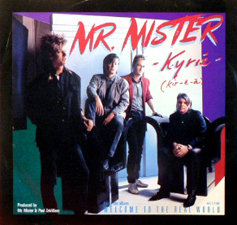 Now, Mr. Mister knew their way around a William Burroughs reference, too (the ”soft machine”), but nobody’s going to mistake them for sophisticates. Richard Page is from Iowa, fa chrissakes. And great voice aside, he’s got a weakness for the trappings of the mystic, but (as Jon noted) without any actual philosophical grounding. He’s no Van Morrison; hell, he’s not even Bono. The formula of fitting quasi-profound aphorisms onto a standard lovelorn pop structure worked in ”Broken Wings,” or just about, mostly because the sound was so seductive. (Never underestimate the power of the 9th chord; just ask Sting.)
Now, Mr. Mister knew their way around a William Burroughs reference, too (the ”soft machine”), but nobody’s going to mistake them for sophisticates. Richard Page is from Iowa, fa chrissakes. And great voice aside, he’s got a weakness for the trappings of the mystic, but (as Jon noted) without any actual philosophical grounding. He’s no Van Morrison; hell, he’s not even Bono. The formula of fitting quasi-profound aphorisms onto a standard lovelorn pop structure worked in ”Broken Wings,” or just about, mostly because the sound was so seductive. (Never underestimate the power of the 9th chord; just ask Sting.)
Dw. Dunphy — I think the best way to sum up this song is to say that it had the fortune of a split personality. The chorus is everything you could want from a chorus in that it wasn’t hard to remember, it was easy to sing along with, and it presented the veneer of sounding like it had something to say… when in actuality it did not. In a pop song, if you can’t pose an intriguing idea, at least pretend you have a thought in your head.
The verses exhibit the same banal Jolt Cola terminology you found in a lot of songs of the time — lines that came off kind of tough and futuristic, but make no sense whatsoever — being all sugar and fizz but no nutrition. “My body burns a jet-like flame” is stupid.
Feerick — I think you’ll find that’s “GEM-like flame,” Dw. It’s a fancy-schmancy literary allusion. Riffing on 19th c. essayist and critic Walter Pater.
Dunphy — Gem-like flame, you say? Well, okay then, that makes all the difference in the world.
Self-immolation is one thing, but comparing yourself to overpriced natural objects mined by poor, subjugated people who will give their lives up just to feed their families and survive, all to satisfy the greed of the pampered, unproductive few? BIG STEP UP.
Jason Hare — I always thought it was a “gin-like flame.” (Makes about as much sense.)
Feerick — I’ll drink to that.
Dunphy — Whatever it is, it may substitute the usual “I’m hot / on fire for you” tiredness that to this day is a poor indicator of passion, but that line makes me roll my eyes every time. It is all the effort used for the chorus, but going one step way too far. And that’s how I feel about the song as a whole. It seems there needed to be someone at the studio or at the label whose job was to reel either Mister or Mr. in but failed to contain them both.
Feerick — Well, yeah. They’re freighting down a very standard scenario with language of the sacred. But why? What is this overwrought hoo-ha about? How does a refrain of ”Lord, have mercy” fit in with a lyric that’s basically a road ballad in the mode of Journey’s ”Faithfully”?
I’ve got a terribly cynical answer: Mr. Mister were obviously writing for radio at this point, and I honestly think they were chasing a U2-sized hit, and haphazardly copped a phrase from Catholic liturgy. But ”Gloria” made emotional sense in a way that this didn’t, as the cry of someone who’s been through a traumatizing conversion experience wrestling with the impossibility of giving himself wholly to God; ”Kyrie,” by contrast, is just another song about missing yer girl back home — which can be a soul-deep experience, don’t get me wrong, but it’s hardly numinous. Love is shattering enough without dragging God into it every time.
Dunphy — It occurred to me that this is about as deep a conversation as Mr. Mister has ever or will ever get about their music.
Lifton — These songs where the verses meander but the chorus is tight and focused always confuse me. Why not take a little more time and make the verse as strong? Could’ve been a classic given the talent involved, but instead it’s indicative of how, by the 1980s, record-making was becoming more important than songwriting. And “Mr. Mister” is a dumb band name.
Feerick — And a bad pun, at that.
Last note: I was honestly surprised to discover that Richard Page is no relation to English musician Martin Page, whose ”In the House of Stone and Light” had a similar pseudo-deep meaninglessness, and even a similar sound. I guess everybody likes to put on their sensitive-intellectual disguise now and then; you score better class of chick if they think you’re deep.
#12 Paul Young, ”Every Time You Go Away” (1985)
Written by Daryl Hall. This was Young’s only US #1; peaked at #4 UK.
Lifton — In which Paul Young reminds everybody that Daryl Hall was once a great pop-soul songwriter. I’d take this over everything Hall & Oates were releasing in the mid-80s.
Cummings — I forever will lump this in with Howard Jones’ remake of his own “No One Is To Blame,” since both piled an instrumental hook on top of an already perfectly good song to get a hit. I also forever will lump it in with SinÁ©ad O’Connor’s remake of “Nothing Compares 2 U,” because both hits inspired their songwriters to resurrect them into their live repertoires in histrionic fashion — somewhere you can find recordings of Daryl Hall trying desperately to reclaim “Every Time” during sets in the late ’80s, or Prince noodling all over “Nothing” during the early ’90s.
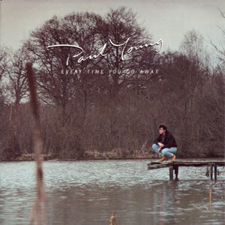 As for “Every Time You Go Away” on its own merits … I preferred Paul Young’s earlier work, and played the hell out of his No Parlez album. Nothing he did afterward, starting with this, ever came close to the quality of his first album for me.
As for “Every Time You Go Away” on its own merits … I preferred Paul Young’s earlier work, and played the hell out of his No Parlez album. Nothing he did afterward, starting with this, ever came close to the quality of his first album for me.
Feerick — Great song, matched with a top-notch voice and an oddball, spacey arrangement. I love the fretless bass — Pino Palladino is a gaddam genius — and the Coral sitar is a bit of left-field brilliance. And Young sings the hell out of it, the graininess of his voice lending the thing a gorgeous resignation that I don’t know if I’d buy from Daryl Hall. So sad, so pleading, but so beautifully done.
And the video is so endearing. Fat little man with bad hair — Ricky Gervais as pop star — bucking for the title of hardest-working man in show biz, busting his hump to connect with his audience. Gawd bless im.
Dunphy — Sure it is overdone in Young’s version, but if you didn’t know it was a Daryl Hall song, you’d think it was a remake of a ’60s soul song, and if that is the worst thing said about your work, you’re pretty lucky. It’s pretty, it does have soul, Young sings but doesn’t oversell it, and I can still listen to it without feeling nausea.
And speaking of nausea…
#13 Starship, ”We Built This City” (1985)
#1 US, #12 UK, #1 Worst Song Ever as rated by Blender (RIP).
Feerick — Okay. I still like ”Find Your Way Back,” so it’s not like I’m philosophically opposed to late-period Starship as such; but I’ve hated this song so much, for so long, that I haven’t listened to it (inasmuch as I could avoid it) for thirty years. In the interest of fairness, I will try to give it a fair hearing now.
…
…
…
Make it stop
Make it stop
FOR THE LOVE OF GOD MAKE IT STOP
I mean, uh, hey. Martin Page co-wrote this. Along with Bernie Taupin. And two other guys. It took FOUR PEOPLE TO WRITE THIS, y’all — one of them the most renowned lyricist in pop.
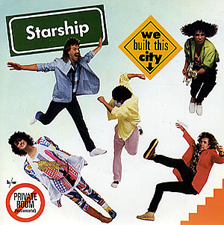 Dunphy — It is almost unfair to say more negative things about this song. I think we can agree, all down the line, that there is nothing here to commend this song to the future. Better it disappear and not be heard again.
Dunphy — It is almost unfair to say more negative things about this song. I think we can agree, all down the line, that there is nothing here to commend this song to the future. Better it disappear and not be heard again.
But we can’t, because people ate this processed bologna up by the steaming roll. It is not on this collection for the sake of quality. It is here because people made this a huge, huge hit. So we can mock the army of songwriters that made it, we can mock the shell of a once prominent rock band for farting it out, we can mock Mickey Thomas for all his Mickey Thomasness, but when all the accused are lined against the wall, WE built this monster.
But we haven’t learned our lesson. Each year we are presented with hit songs that never deserved to be hit songs, and stars that instead of money and prizes should have been kicked in the crotch with a jackhammer, but we give them a pass. So yeah. It isn’t their complacence we should be angry about. It’s our complacence about challenging their complacence. We suck as a species. Maybe the Canadian geese will do a better job of it when we’re gone.
Cummings — “Kicked in the crotch with a jackhammer”? Dw., your prose burns with a jet- (or gem-) like flame today.
Cummings — Long ago identified as one of the four or five Worst Number Ones of the 1980s, “We Built This City” is pure poppycock, a bunch of nonsense strung together in High ’80s Style (by the mutant remnants of a ’60s band, no less). If you think about it, it’s sort of a sub-“Video Killed the Radio Star” created by boomer waste-cases for Gen X pop-tarts, kids who chose high hair and day-glo Benetton and watched John Hughes movies without absorbing the music within them. Now, run, Benetton children — run from the giant tumbling dice!
Lifton — Every possible joke about this song has already been said, so I’ll keep schtum here.
Feerick — When even Dave Lifton can’t be bothered to articulate his bottomless scorn — that’s the kiss of death, right there.
#14 John Parr, ”St. Elmo’s Fire (Man In Motion)” (1985)
Co-written with David Foster. #1 in the US and Canada, Top Ten just about everywhere else.
Feerick — Oh, God, Rhino Records, why do you hate me so? What have I ever done to you?
This was originally written about Canadian paraplegic athlete Tim Hansen, which is sweet, I guess. But what’s worst about ”Man In Motion” is its own desperate self-importance. It palpably wants to be an anthem for young loves breaking free and forging their own path — a theme song for yuppie DINKs, in context — and as such it pours on the effects that it thinks will make it sound appropriately epic: driving sequencers, soaring horn lines, vague, grandiose lyrics about high-flying eagles and blazing skies. It’s The Colbert Report as a pop song.
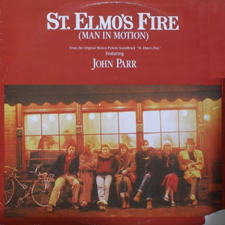 But like Colbert, it’s all fakey show-biz hoo-hah, synthetic to the core, as phony and tacky as Parr’s glitter stars-and-stripes guitar — but unlike Colbert, it’s meant to be taken seriously. The lyrics are practically dada poetry — a string of buzzwords and catchphrases, generic indicators for quote-unquote ”freedom,” meaningless in themselves — even contradictory: he needs to fly, he needs a set of wheels; everything has changed and he’s all alone, his time is now and he’s coming alive. It’s purposely unspecific, aiming for something universal — but that very quality works against it. By trying to be all things to all people, it ends up being as insubstantial as — well, as St. Elmo’s fire.
But like Colbert, it’s all fakey show-biz hoo-hah, synthetic to the core, as phony and tacky as Parr’s glitter stars-and-stripes guitar — but unlike Colbert, it’s meant to be taken seriously. The lyrics are practically dada poetry — a string of buzzwords and catchphrases, generic indicators for quote-unquote ”freedom,” meaningless in themselves — even contradictory: he needs to fly, he needs a set of wheels; everything has changed and he’s all alone, his time is now and he’s coming alive. It’s purposely unspecific, aiming for something universal — but that very quality works against it. By trying to be all things to all people, it ends up being as insubstantial as — well, as St. Elmo’s fire.
Dunphy — A man in motion tends to stay in motion. A man not in motion tends to be dead. And this wad is motionless.
Cummings — In perfect symmetry with the surrounding filmic inanity, Mr. Parr gave us a Brat-Pack “Eye of the Tiger” for post-collegians whose biggest challenge was whether or not to turn into stereotype Judd Nelson (suited-up corporate asshole) or stereotype Rob Lowe (sax-playing, earring-wearing, get-the-fuck-on-with-your-life druggie asshole). Somehow this song didn’t seem to apply to Emilio Estevez, though.
And for Lowe, what was “burnin’ in me” was the clap, amirite?
Feerick — I love how Rob Lowe is in the video for about a second-and-a-half. He showed up and fulfilled his contractual obligation, but make no mistake, he did not want to be there.
Lifton — If I were Matt Wardlaw, I would say this song is “Naughty Naughty.” But then, if I were Matt Wardlaw, I would have no reason to say that because I would think this song is awesome. But I am not Matt Wardlaw, and can therefore say that the song is a piece of shit.
I guess that means I’ve effectively ruined Jeff Giles’ dream of having Michael Parr interview John Parr.
As awful as this is, it pales before the rewrite.
http://www.youtube.com/watch?v=gAIQWzW1MIc
Feerick — “Tim Tebow’s Fire”? You have got to be SHITTING me. Oh, that’s just embarrassing, even by the standrads of being John Parr. Why does an Englishman want to remake himself into such an Ugly American jingo meathead, anyway? I always figured the stars-and-stripes guitar was a sort of if-you-can’t-beat-’em-join-’em ploy, but apparently they breed rednecks in Nottinghamshire, too.
#15 Robert Palmer, ”Addicted To Love” (1986)
A Number One in the US and Australia, #5 UK. Apparently there’s a video, too…
Dunphy — Zombie hot chicks. We can grouse for paragraphs about the goodness or badness of the song, drawing the conclusion that even if it is mediocre it isn’t totally awful. It’s an ’80s hard rock song with barely a bloodflow, but even in its inertia there is something. Did it deserve so much attention? No, but I would never say this is a worse song than “We Built This City.”
But that’s not what made this song a hit.
A tangent: I bought Tiffany’s debut album around the mid-’80s. Why? because I was stupid. Didn’t much like her music. Didn’t matter. She was a hot redhead and I was Charlie Brown and that was it. I bought the record through Columbia Record & Tape Club. Realizing after the fact that I was never going to actually listen to the thing, I wound up reselling it to someone at school… probably for a buck.
(This isn’t a slight against Tiffany, mind you. I just wasn’t into her music. I add this qualifier in case Tiffany’s reading and wants to give me a call.)
(On second thought, that’s the whole point of this digression.)
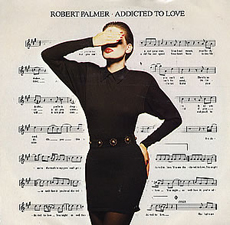 Reeling it in — sex sells. “Addicted To Love” wasn’t a hit because of the dubious qualities of the song itself. It was a hit because hormones make us stupid. We know the song itself, and we know Palmer wore a suit in it, but we also know the zombified models behind him wore skin-tight sheer black dresses and bounced seductively as they swayed back and forth, pretending to play the music. If you mention this track out of the blue to most people, they don’t talk about it as much as they talk about the models. That was the victory of the music video era that, at a certain point, anything that provoked a tingle in our netherlands also provoked our instincts for purchase. No jiggly models in the video would have meant no hit song for “Addicted To Love.”
Reeling it in — sex sells. “Addicted To Love” wasn’t a hit because of the dubious qualities of the song itself. It was a hit because hormones make us stupid. We know the song itself, and we know Palmer wore a suit in it, but we also know the zombified models behind him wore skin-tight sheer black dresses and bounced seductively as they swayed back and forth, pretending to play the music. If you mention this track out of the blue to most people, they don’t talk about it as much as they talk about the models. That was the victory of the music video era that, at a certain point, anything that provoked a tingle in our netherlands also provoked our instincts for purchase. No jiggly models in the video would have meant no hit song for “Addicted To Love.”
Feerick — ”Addicted To Love” is such a slick production that it’s almost shocking to realize that it is, essentially, a blues. The bassline is what gives it away — a roadhouse boogie beneath the synth blats and the high-tech guitar crunch. (For some reason I always associate that antiseptic digital processing with those Ibanez guitars that use LEDs for fretboard dots. No reason — I don’t know if Eddie Fernandes played one or not — they just look like that tone sounds, like a spaceman’s idea of rock n’ roll badassery.)
Anyway. Robert Palmer had some bluesmanship of his own going on here. Even on this — which is not, for my money, one of his best efforts — he has an absolute mastery. It’s the elegance that people remember about Palmer, the suits and the perfect hair and the air of arch sophistication — but the dude could fucking holler. Even if he didn’t, for the most part, choose overtly bluesy material, he could really rip it up.
Lifton — What disco did to rock groups in the late-70s, AOR did to blue-eyed soul singers in the mid-80s. Great voices shoehorned into lame songs with slick production that they took all the way to the bank, with a follow-up that sounded like it. That said, I like the guitar lick that’s plays underneath the titular line here.
Cummings — In which Mr. Palmer dumbed himself down into the biggest hit of his career. And why the hell not? The song seemed inevitable even upon first hearing, a souped-up juggernaut of power chords, horns and sleazy lyrics. The video added to that inevitability, a perfect distillation of MTV’s objectification-as-sex ethos. The whole thing is a clichÁ© by now — heck, it was a cliche by the time “Simply Irresistible” appeared — but it still packs a punch, if you can manage to hear it with fresh ears.
Feerick — This gives me an excellent opportunity to give a big shout out to author Marc Tyler Nobleman, who’s been tracking down and interviewing a lot of the video babes of MTV’s classic era. He’s still trying to track down a couple of the zombie girls from “Addicted To Love,” but there are a bunch of interviews up at his site already, and they’re pretty entertaining. (SPOILERS: When music videos first became a thing, nobody knew what the hell they were doing!) Check it out!





Comments